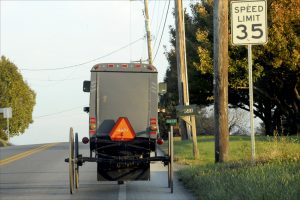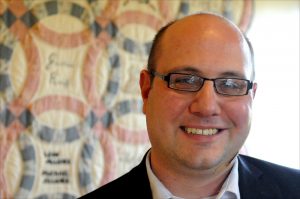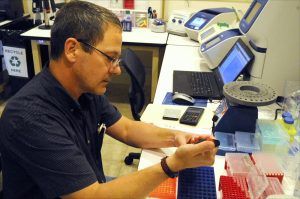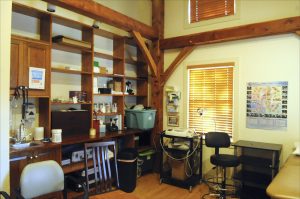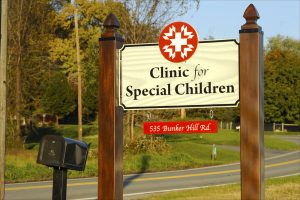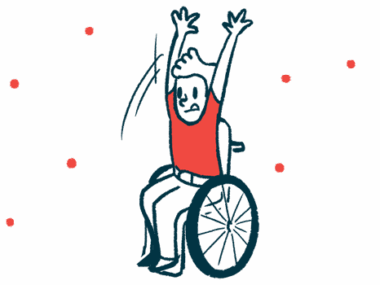Rural Pennsylvania Clinic Treats Amish, Mennonite Children Who Have SMA
Written by |
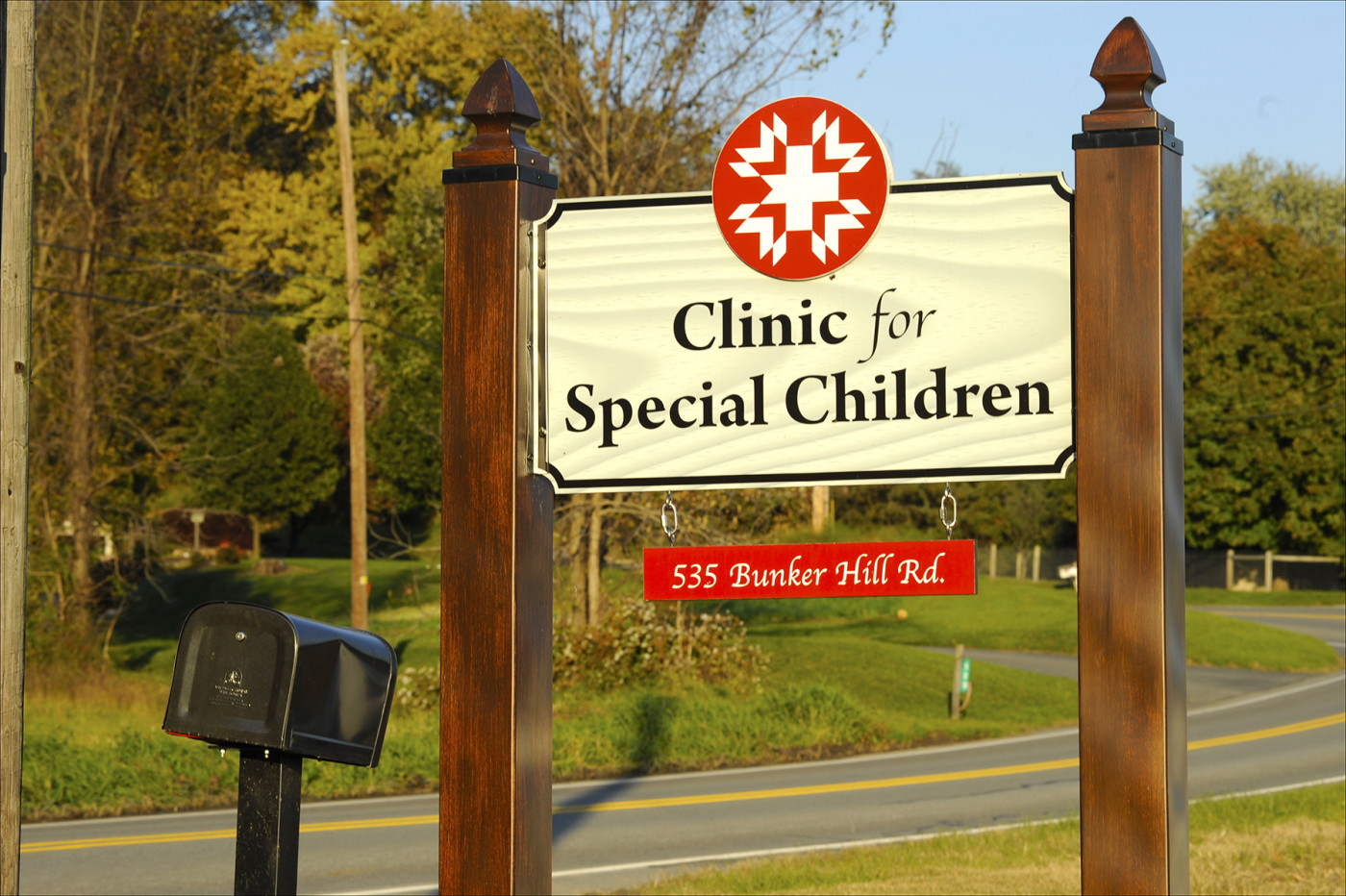
Entrance to the Clinic for Special Children in Strasbourg, Pennsylvania. (Photo by Larry Luxner)
Visitors to the Clinic for Special Children (CSC) just outside Strasburg, Pennsylvania, might be forgiven for thinking they’ve made a wrong turn.
Hidden at the end of a long, winding driveway off Bunker Hill Road, the clinic, which serves the Amish and Mennonite communities of Lancaster County and beyond, looks and feels like a 19th-century schoolhouse, with its timber-frame construction and kid-friendly decorations.
But the methods employed here are anything but antiquated.
Since its founding nearly 30 years ago, the specialized doctors at CSC have used the latest in genetic counseling, molecular diagnostic testing and dietary support to treat kids for 264 disorders including spinal muscular atrophy (SMA), maple syrup urine disease, glutaric acidemia type I (GA-I) and Charcot-Marie-Tooth disease.
“Anything that has a genetic basis to it, we’re interested in,” Adam Heaps, the clinic’s executive director, told SMA News Today during a recent tour of the clinic.
“It really grew out of the needs of the Amish and Mennonite communities in Lancaster County,” he said. “Because they’re an isolated population, they have a higher incidence of rare recessive disorders, some of which are fairly unusual for the standard medical system to interact with.”
Ask questions and share your knowledge of SMA in our forums.
Here in southeastern Pennsylvania — where in some areas Old Order Amish and Mennonites make up nearly a fifth of the population — random genetic drift is a recurring problem.
SMA plagues Amish, Mennonites
Members of the two groups, which are descended from a small group of Swiss Anabaptists who migrated to North America during the early 18th century to escape religious persecution, live humble lives and generally don’t marry outside their immediate communities. Nearly all of those who now inhabit “Pennsylvania Dutch” country stem from 80 to 100 original “founders” for the Amish, and 200 to 240 “founders” for the Mennonites.
“Because you have a limited number of these founders, you also have a limited gene pool. So, people living today are going to be related to the same ancestors in multiple ways,” Heaps said. “For the Amish and Mennonites, that means if one of those people was a carrier for a recessive disorder, it puts their children at risk for inheriting two copies of a defective gene.”
Medical director Kevin Strauss, MD, says about 3,500 patients are in the clinic’s database, including roughly 1,100 active patients (those who have been seen within the past two years).
Known for shunning modern-day conveniences such as automobiles, washing machines and computers, the two groups traditionally also have had little to do with each other.
“The Amish and Mennonite communities generally don’t intermingle very much because of their age-old scriptural differences,” Strauss said. “This clinic is one of the very few social enterprises that brings the two communities together.”
In general, he said, SMA is about five times more prevalent among Amish and Mennonites — collectively known as “plain people” — than in the general U.S. population, where 1.4% of blacks and 2.1% of whites are carriers of the disease.
But in the Mennonite population, the carrier frequency is 3.7%, with SMA affecting about one in every 3,000 births. And among members of the Hutterite colony of South Dakota, the carrier frequency is 13% — translating into an SMA birth incidence of one in 237.
Quilt auctions help keep clinic afloat
CSC’s services are incredibly inexpensive compared to conventional clinics. An hour-long SMA consultation costs only $50. Without insurance, that same visit to a primary-care doctor would cost $120 to $170, and last only 10 minutes. Likewise, genetic tests are just $50 — $15 to isolate DNA from the blood, and $35 for a targeted mutation test.
“It’s only through the generosity of the community that we can do that,” said Vince Carson, the CSC’s pediatric neurologist. “Other clinics have to see patients in order to make money to pay the bills. But because only 14% of our revenue comes from patient fees, this enables us to spend two hours with a new patient, and one hour for follow-up visits. This way, I can learn more about the different diseases we see.”
Heaps, who grew up in Lancaster County and has been executive director at CSC since 2014, noted that his clinic doesn’t accept insurance because most of its patients don’t believe in it.
“Typically, Amish and Mennonites do not have a cultural aversion to modern medicine, as long as it’s affordable, accessible and practical,” he said. “They do, however, have a religious aversion to insurance, so they’re paying out of pocket. That comes from the idea that the community should take care of its members, and they don’t want to yield that responsibility to an insurance company or the government. Some people feel it’s not trusting God’s will.”
In fact, both Amish and Mennonites are specifically exempted from the Affordable Care Act that requires Americans to carry private or public health insurance. And since Medicare took effect in 1965, Congress has exempted both communities from paying into the program.
The clinic’s fiscal 2019 budget is $3.8 million. Fundraising events and public auctions of everything from quilts and furniture to horses and farm animals accounts for about $900,000 of that. Revenues also come from private donations, collaborative agreements and participation in clinical trials.
“We’re not heavily grants-focused,” said Heaps, whose clinic has 16 full-time and three part-time employees. “The reason why we can provide these services is through philanthropy and support, from both inside and outside the community.”
Natural history study follows SMA
CSC belongs to the Plain Community Health Consortium, a group of five clinics in Delaware, Indiana, Ohio, Pennsylvania and Wisconsin that all serve Amish and Mennonite populations.
Carson said that because of genetic differences in founder populations, the mix of diseases affecting specific communities varies. For example, Amish in Indiana suffer a high rate of limb-girdle muscular dystrophy type 2a and 2e, while Batten disease is more common among the Amish of Ohio.
Yet, even among SMA patients, the disease takes on different forms in the Amish and Mennonite communities, according to a recent natural history study conducted by CSC.
The study, “Spinal muscular atrophy within Amish and Mennonite populations: Ancestral haplotypes and natural history,” was published in the journal PLOS One. It examined 42 Mennonite and 14 Amish children and adults. Among other things, it showed that among Mennonites, about 70% of SMA patients had type 1, with two copies of the survival motor neuron, or SMN2, gene; another 20% had type 2, with three copies of SMN2, and 10% had type 3 (four copies). But all the Amish patients had type 1.
The study found that life expectancy among SMA type 1 babies without ventilator intervention was 3.9 months among Amish and 5.7 months among Mennonite infants; that compares with 8.2 months for non-ventilated SMA type 1 babies born to “outbred” families (those who don’t breed within a genetically isolated population).
Amish and Mennonite families generally reject in-patient hospitalization, ventilators and feeding tubes as invasive measures that only make their children suffer more, Carson said.
“For children with SMA type 1, there wasn’t a whole lot of intervention,” he said. “But when Spinraza (nusinersen) was approved in 2016, that changed everything. That’s what prompted a lot of the work we’re doing.”
Spinraza, Zolgensma offer hope
Doctors generally give Spinraza, developed by Biogen, through an injection into the cerebrospinal fluid every four months throughout the life of someone with SMA. Yet, that’s not always feasible or even recommended.
“Our first challenge was, how do we administer Spinraza to patients who have scoliosis, spinal fusions or rods in their back?” Carson said. “We came up with the idea of connecting a catheter to a port commonly used for chemotherapy. We decided to try this on a family that was interested, and it worked very smoothly. Our thought was that if Spinraza significantly slows or halts the progression of the disease, that’s a big win for our patients.”
The clinic’s new approach was the focus of a recent study, “Preliminary Safety and Tolerability of a Novel Subcutaneous Intrathecal Catheter System for Repeated Outpatient Dosing of Nusinersen to Children and Adults With Spinal Muscular Atrophy,” published in the Journal of Pediatric Orthopaedics.
In addition, CSC is one of 26 sites in 13 countries — and the only one in Pennsylvania — that’s participating in a Phase 3 clinical trial for Zolgensma (AVXS-101), a gene therapy for SMA being developed by AveXis, a unit of Swiss pharmaceutical giant Novartis. The trial (NCT03505099), called SPR1NT, is recruiting SMA type 1, 2 and 3 patients who don’t yet show any symptoms.
The Clinic for Special Children also is now aggressively testing Pennsylvania Amish and Mennonite populations to see if they’re carriers of SMA, said Heaps.
“We got funding that allows us to do carrier testing for SMA for free,” Heaps said. “If we can identify Amish and Mennonite couples who are carriers, that allows us to know who’s at risk for having a child affected with SMA. The umbilical cord blood can be sent to us to determine genetically whether or not the child has SMA.”
He added: “Even if they test positive for SMA, these people would still typically have children, so carrier testing is done more to prepare the family for what might happen than to prevent them from having kids. SMA is not yet on the Pennsylvania newborn screening panel, so we’re really kicking into high gear to test families — with the idea being the sooner, the better.”
